The Best Homemade White Bread. Bread baking is on the rise because nothing says home baked comfort food goodness like a perfectly baked crusty loaf of homemade bread, fresh from the oven. This recipe is well over 40 years old and turns out perfectly every time.
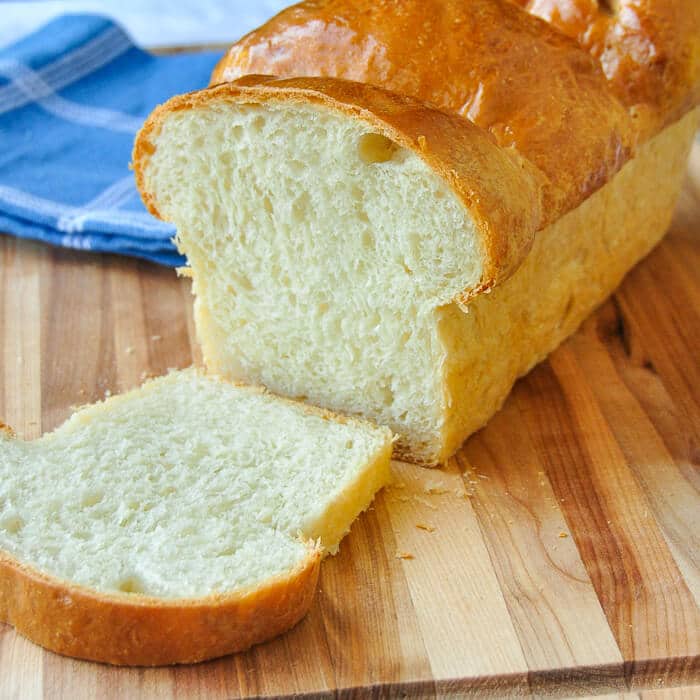
The Best Homemade White Bread
Originally published January 2008.
When I think of Newfoundland baking, the first thing that comes to mind is homemade bread rising high above large bread pans in 2 or 3 bun loaves. As a child of the 60’s and 70’s in Newfoundland, it was still the rule rather than the exception to find homemade bread in many homes.
The women in my extended family all still made homemade bread during my childhood.
With freezers in most homes by that point, though, daily bread baking was no longer necessary. Still many baked at least once or twice a week.
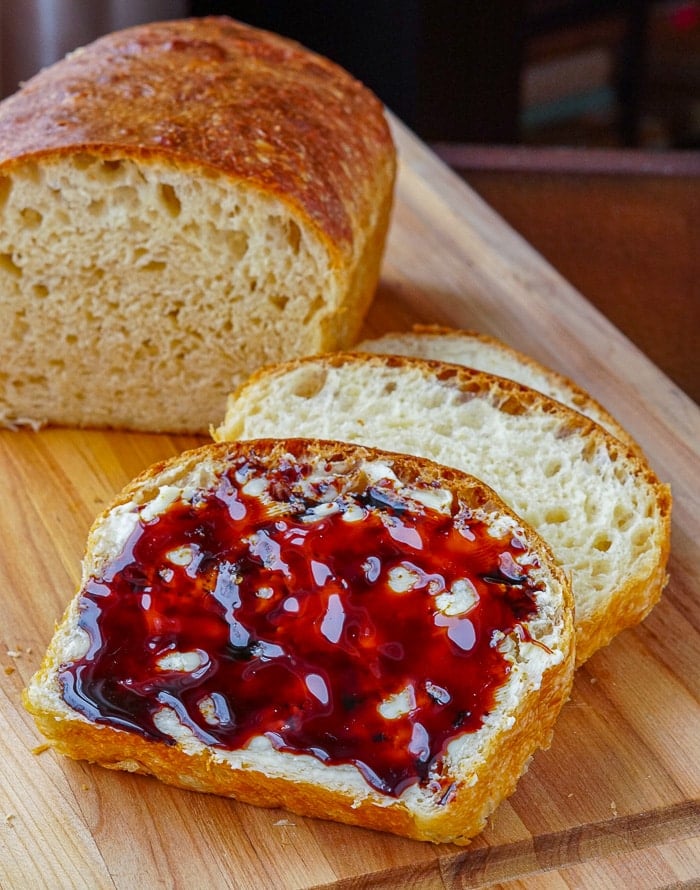
Molasses & butter on fresh baked bread is a real Newfoundland tradition.
Who made the best homemade white bread?
Debates within the family were common on the topic of who made the best bread. A good deal of pride was taken in the ability to turn out a good batch.
…I always liked my moms twin sister, Aunt Moo’s (Muriel), the best. 😉
Some senior ladies with large families of 10 or more children have told me numerous stories over the years. Stories of baking large batches of 8, 10, 12 or more loaves every day. Plus
twice on Saturdays so as to avoid baking on a Sunday.
It was hard work back then keeping all of those kids fed. I don’t think most would be up to the task these days.
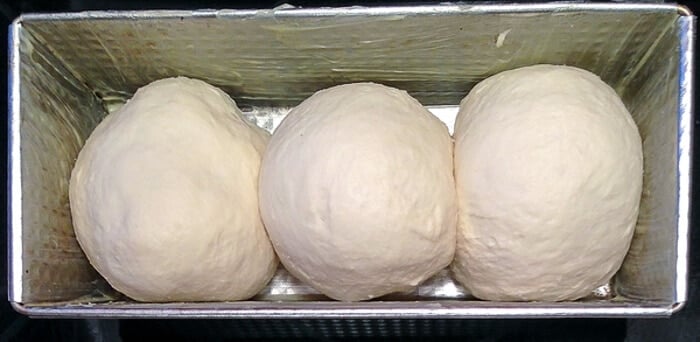
The Best Homemade White Bread
Nan’s Homemade White Bread loaves were huge!
The loaves seemed much larger in those days and not just because I was much smaller! I’ve seen some pretty big bread pans used in my time.
I remember it was necessary to trim the side off a slice of Nan Morgan’s bread just to get it in her drop down side toaster. That’s the old fashioned kind that only toasted on one side and you had to turn the slice over to toast the other side.
Coming from a large family myself, the second side was almost never toasted. That’s because it would have taken too long to make toast for all of our tribe.
I must have been about 10 before I had bread toasted on both sides. LOL!
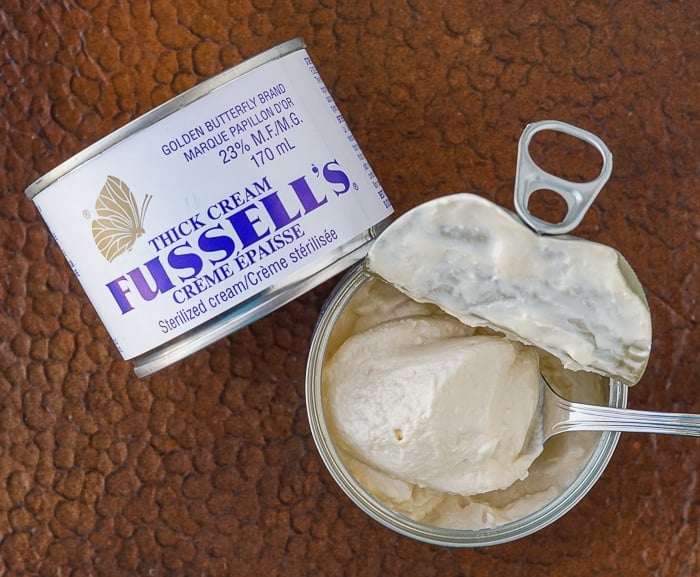
Fussell’s Cream. The perfect topper for pies, tarts and many desserts.
One of the things we all enjoyed back when I was growing up was thick slices of fresh bread topped with jam and Fussels canned cream. Now that I think of it, that was very much like what the British do with scones.
Nowadays I sometimes make Homemade Clotted Cream which is just amazing too!
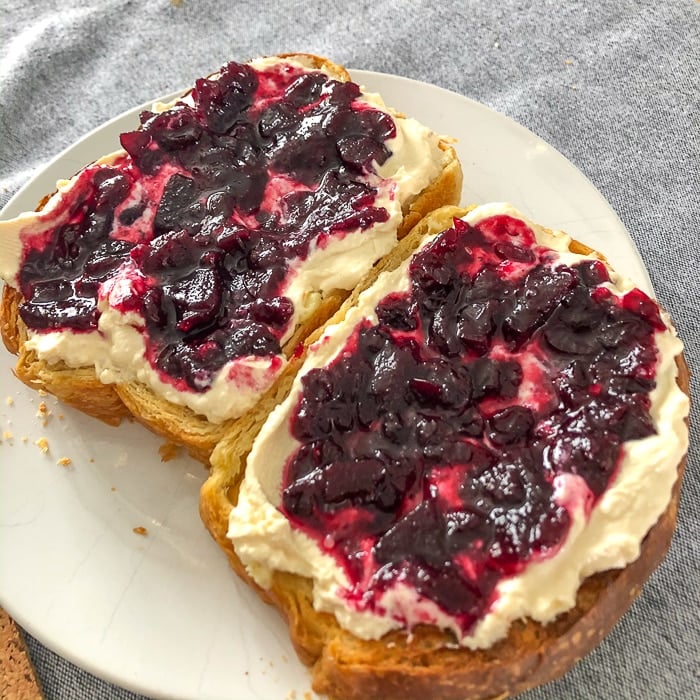
Homemade bread with jam and cream. A taste of my childhood.
I still adore it to this day. Most recently I had it with our Partridgeberry Apple Jam. It definitely brought me strait back to childhood.
Keeping a tradition alive.
It is now much more of a rarity to find families who bake bread on a regular basis. However, I have tried to keep that tradition as part of my own family life.
I have been baking bread with my own children since they have been able to stand on chairs at the table and knead their own little balls of dough.
They still love making it and my son in particular cannot go more than a few days without his fix of homemade bread. Although we try to encourage more whole grain varieties these days. Still, he’d take plain homemade white bread over any other kind.
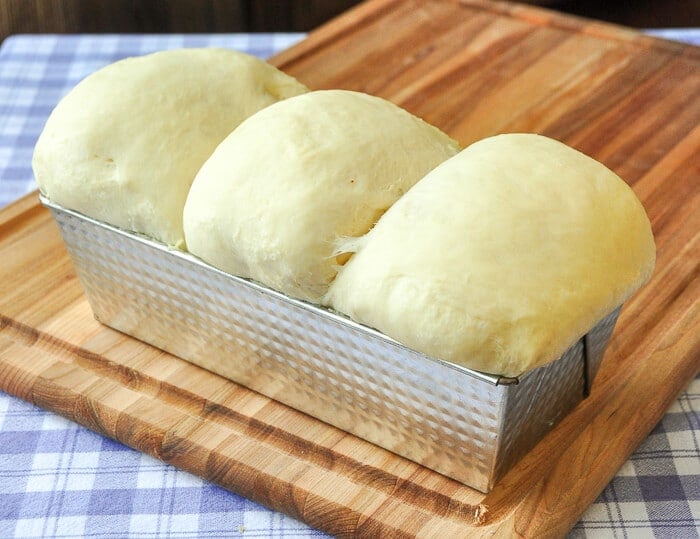
The Best Homemade White Bread
Homemade White Bread in smaller batches.
These days we make much smaller batches in much smaller bread pans, usually no more than a couple of loaves at a time. Often, I now prefer to use disposable aluminum loaf pans that make more toaster friendly sized slices.
Recently I’ve acquired some very nice narrower, longer pans that make ideal sized slices. It much less likely to over bake your bread in aluminum pans as they do not carry the heat as much as heavier pans.
Recently, I received an email request for a good basic homemade bread recipe from a young Newfoundlander living in Alberta. She wanted a recipe for “real Newfoundland Homemade bread.”
I don’t know that such a thing definitively exists. But, I can give you the recipe that I have been using myself with slight evolutions for over 30 years.
So go make bread and share it. You’re bound to make someone happy.
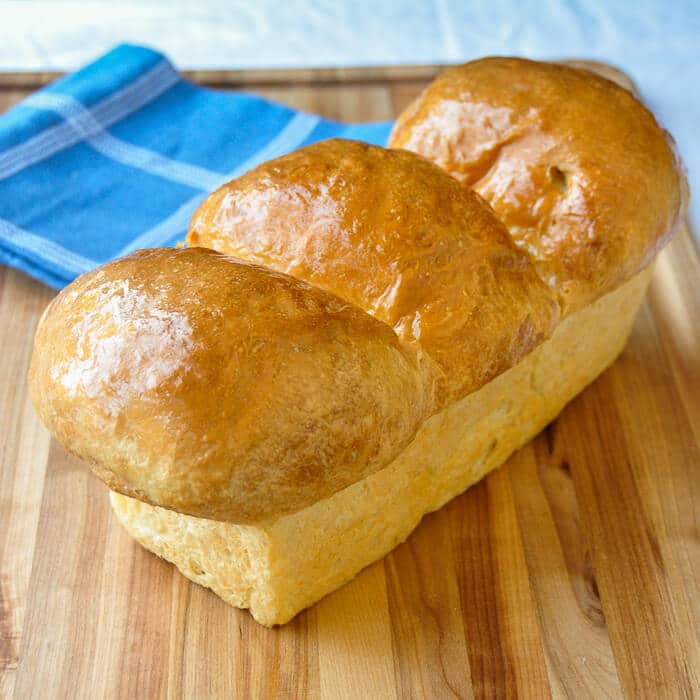
The Best Homemade White Bread
Don’t forget the toutons!!
There is no way to talk about making homemade bread in Newfoundland without mentioning one thing. The joys of one of the province’s favourites, Toutons!
If you’ve never tried these pan fried pieces of leftover bread dough, you are in for a serious treat. I talk all about Toutons in this post.
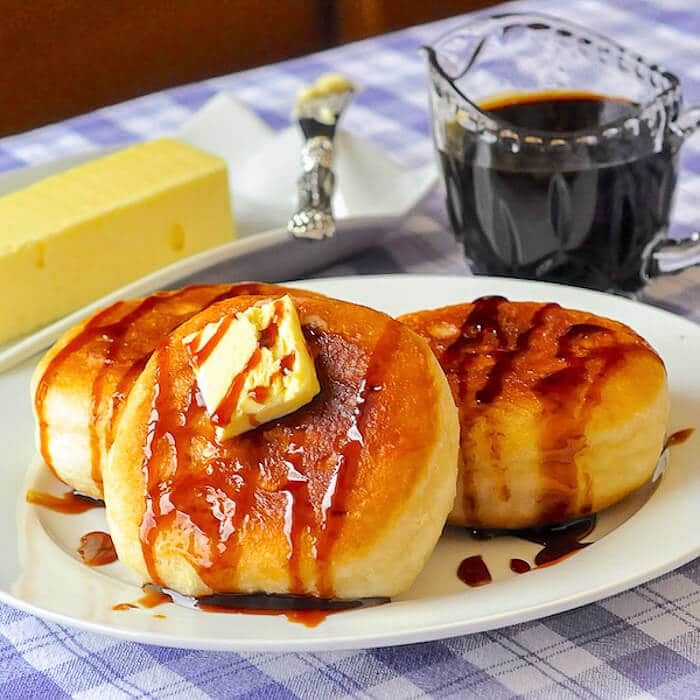
Toutons – a real Newfoundland favourite!
Measuring flour correctly.
It is easy to over measure flour for any recipe by as much as 30% or more as you can see in the photo below. Both are one cup of flour but one weighs much more. Read more on how to avoid this common baking pitfall in our post on How to Measure Flour Correctly.
2020 update on an often asked question.
Many people have asked about the shape of the loaves we bake here in Newfoundland. I do not have a definitive answer for the reason for a 3 bun loaf, although we mostly made 2 bun loaves when I as growing up.
I’ve been told there is a connection to the Holy Trinity, and was a way of blessing the loaf so that it would rise well. I know many traditional bakers who would make the sign of the cross over the bread when it was set out to rise. So, this does make sense to me.
Others say it’s so that there will be more “love slices” or “kissing slices”. Those are the slices cut from where the dough balls meet.
The crust on these slices is a little softer from being in that slightly sheltered crater between the individual loaf sections. In may families they were always the preferred slices. I know a few families where the kids always fought over them.
Whatever the reason, it seems to be a particular baking quirk from this part of the world. Try it. You may begin fighting for a “love slice ” yourself.
Brunch lover?
You’ll find dozens of other great recipes like this in our Breakfast & Brunch Category and even more ideas in our Muffins, Tea Buns & Scones Category.
Like this Homemade White Bread recipe?
You’ll find many more locally inspired recipes in our Newfoundland Category.
It’s easy to keep up with the latest home style cooking & baking ideas from Rock Recipes. Be sure to follow Rock Recipes Facebook Page and follow us on Instagram.
Plus you’ll see daily recipe suggestions from decadent desserts to quick delicious weekday meals too.
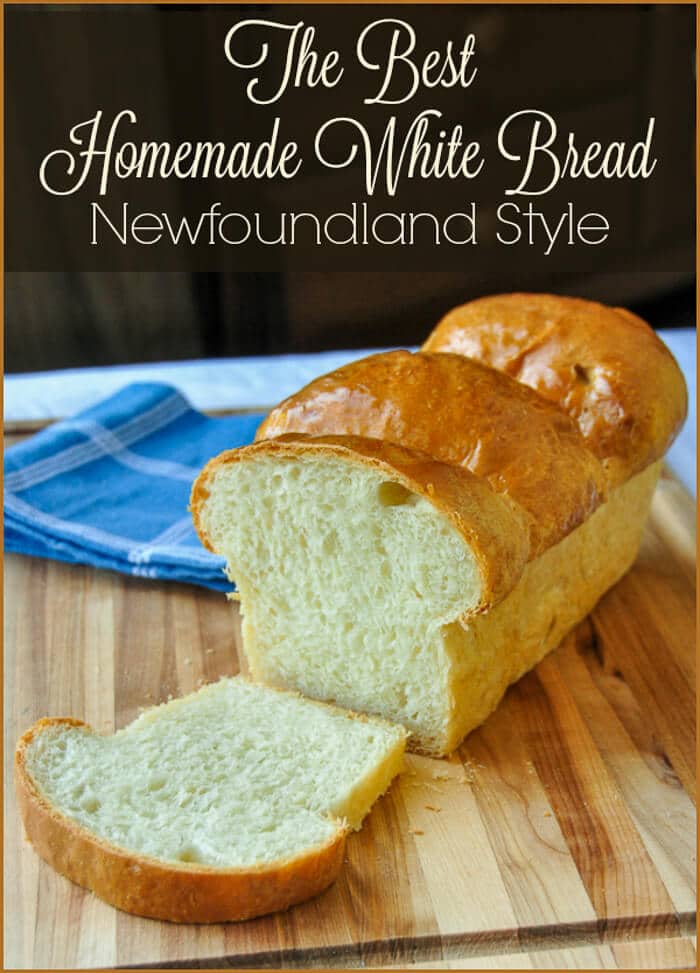
The Best Homemade White Bread
You can also sign up for our FREE newsletter to know immediately when we add new recipes. You’ll also get weekly suggestions for great family friendly meals and desserts too!

Rock Recipes a participant in the Amazon Services LLC Associates Program. An affiliate advertising program designed to provide a means for us to earn fees by linking to Amazon.com and affiliated sites. Our product recommendations are almost exclusively for those we currently use or have used in the past.
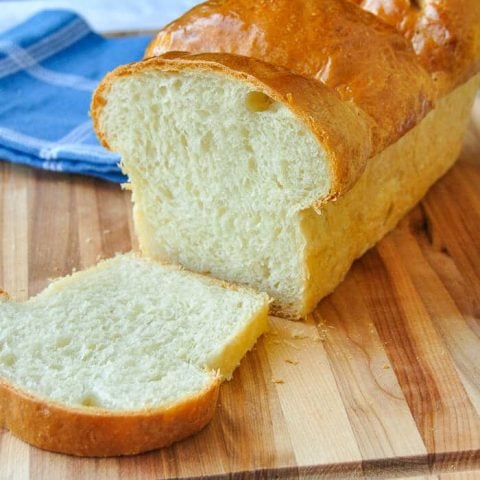
The Best Homemade White Bread
The Best Homemade White Bread - nothing says home baked comfort food goodness like a perfectly baked crusty loaf of homemade bread, fresh from the oven. This recipe is well over 40 years old and turns put perfectly every time.
Ingredients
- 6 1/2 cups (approximately) all purpose or bread flour
- 1 pkg, 5 grams traditional active dry yeast
- 2 tsp fine salt
- 3 tbsp sugar
- 3 tbsp melted butter
- 2 cups lukewarm whole milk
- 1/2 cup lukewarm water
Instructions
- Dissolve 1 tbsp of the sugar in the half cup of lukewarm water. Sprinkle the yeast over the surface of the water and let stand for about 15 minutes until the yeast foams well, then stir it up.If you prefer to use instant yeast, just add it to the flour mixture in the instruction below.
- Combine 3 cups of the flour along with the 2 tbsp sugar and 2 tsp salt in a large bowl or in the bowl of a large electric mixer that uses a dough hook.
- Add the prepared yeast, melted butter and warm milk.
- Using a wooden spoon or the regular paddle of your electric mixer mix for 4-5 minutes until the mixture is smooth with no lumps.
Mixer or hand kneading
- If using an electric mixer, switch to the dough hook at this point and begin to slowly incorporate the remaining 3 1/2 cups of flour. If not using an electric mixer keep mixing in the flour gradually until a soft dough forms that leaves the sides of the bowl. (Note: You may need to use a little more flour. Depends on the time of year and humidity sometimes. If you have a to add another 1/2 cup or so, don't worry. Add only enough flour to form a dough that releases from the sides of the bowl and remains slightly tacky but able to be handled with your bare hands.)
- Turn the dough out onto the counter top or bread board to knead.
- Knead the dough for an additional 10 minutes either in the electric mixer or using your hands on a bread board or counter top.
The rise
- Cover dough and leave to rest and rise for one hour. Punch the dough down and knead it for a few minutes by hand before letting it rest for another 10 minutes.
- Grease 2 medium loaf pans. Divide the dough into 4-6 equal portions. Form each division into a ball. Place 2 or 3 balls of dough in each loaf pan.
- Cover with a clean tea towel and allow the dough to rise until it is about 2 inches above the rim of the pan, about 2 hours depending on room temperature.
Cold proofing
- (NOTE: At this stage, the bread dough can be cold proofed overnight in the fridge if you want to serve it freshly baked early the next day or just want to save time in advance. Just cover the pans with a clean tea towel. You can spray the surface of the dough with water from a spray bottle to prevent the surface of the dough balls from becoming too dry if you like but this is not really necessary with the humidity in most fridges. Just remove the pans from the fridge in the morning and allow them to finish raising to about 2 inches above the pan rim as shown in the photo above, which could be another 1-2 hours and bake as directed below.)
Baking
- Bake in a preheated oven at 350 degrees F for 30-40 minutes depending on the size of the pans that you are using. The loaves should have a golden crust and sound hollow when tapped to be fully baked.
- When baked, turn loaves out onto a wire rack to cool. Brush the tops with melted butter if desired to soften the top crust.
Notes
The nutritional information provided is automatically calculated by third party software and is meant as a guideline only. Exact accuracy is not guaranteed. For recipes where all ingredients may not be used entirely, such as those with coatings on meats, or with sauces or dressings for example, calorie & nutritional values per serving will likely be somewhat lower than indicated.
Recommended Products
Rock Recipes a participant in the Amazon Services LLC Associates Program, an affiliate advertising program designed to provide a means for us to earn fees by linking to Amazon.com and affiliated sites. Our product recommendations are almost exclusively for those we currently use or have used in the past.
Nutrition Information
Yield
20Serving Size
gAmount Per Serving Calories 63Total Fat 3gSaturated Fat 2gTrans Fat 0gUnsaturated Fat 1gCholesterol 7mgSodium 257mgCarbohydrates 8gFiber 0gSugar 3gProtein 2g
The nutritional information provided is automatically calculated by third party software and is meant as a guideline only. Exact accuracy is not guaranteed. For recipes where all ingredients may not be used entirely, such as those with coatings on meats, or with sauces or dressings for example, calorie & nutritional values per serving will likely be somewhat lower than indicated.

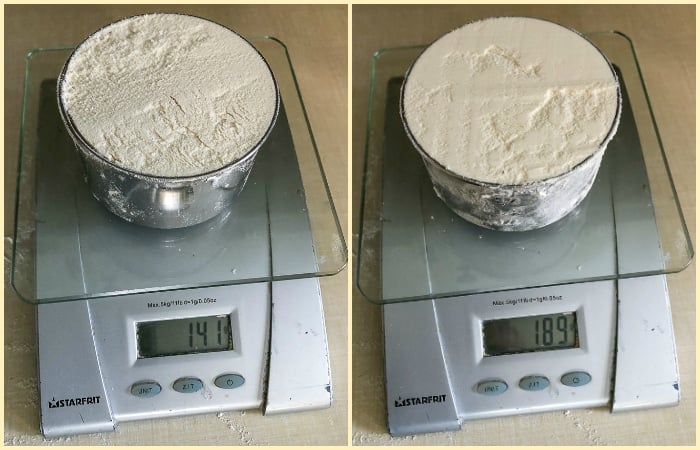
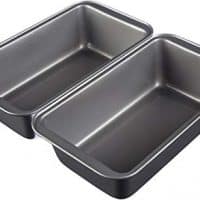
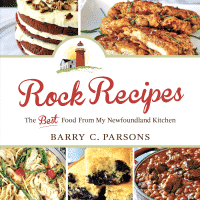
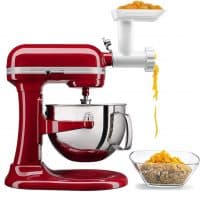
Betty
Friday 29th of March 2024
Absolute perfection!! I added an egg to the recipe to make it even lighter and fluffier. AMAZING!!!
Hayley
Wednesday 4th of November 2020
My grandma is from Newfoundland, and we attempted this recipe the other day. It didn’t turn out great (she said it was “dunched,” haha) because we put the instant yeast in with the flour and didn’t compensate for the missing water. Maybe that could be added as a note in the recipe? (Sorry if it is and I missed it!) Anyway, I tried it again and let the yeast bloom, even though it is instant yeast, and today she said that batch looked just like her mother’s. Success! I’m so happy that it turned out the second time. Thanks for this!
Brad
Friday 3rd of July 2020
Hello Barry... I’ve made this recipe of bread a number of times and I adore each oitime how it turns out... not to mention my gradual improvement in making the individual buns. My question involves multigrain flour... if I wanted to make a multigrain bread would you suggest half white flour (3 1/4 cups) and half multigrain flour (3 1/4 cups). Or with this recipe could I use all multigrain flour (the full 6.5 cups as in the recipe). Thanks in advance...
Carolyn
Tuesday 12th of May 2020
I have been reading your comments about making bread. Very interesting and tips worthy of trying out. Like your memories, growing up, every mother and homemaker made bread. Sometimes 2-bun loaves but mostly 3. I had never heard of the trinity thing before. I was always told that 3 buns were made because it kept the bread from being soggy or heavy. 2 buns would work sometimes but 3 were best. With my cooking experience over my lifetime, I have found that different climates have different effects on recipes and I have had to adjust recipes accordingly. Maybe the damp NL climate is what made the trend of 3-bun loaves ( everyone wanted the lightest bread possible).
Donna
Tuesday 28th of January 2020
If anyone has made this in their breadmachine (like a,Zojirushi), what adjustments did you make?